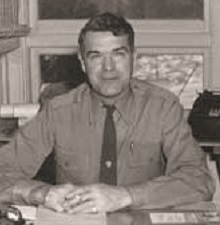 |
Homer W. Robinson Yosemite National Park, CA Mariposa, CA Fruita, CA Myrtle Point, OR Coulee Dam, WA Lakewood, CO Aurora, CO QCWA # 14502 Chapter(s) 4 and 87 |
Homer Wallace Robinson was born May 27, 1906 and died Feb 6, 1984 at age 77 years, 8 months, at Coulee Dam, Washington.
He was married to John T. Mullady's first wife, Gertrude P. Mullady, on May 7, 1958, Los Angeles, California, when he was 51 and she was 45.
Robinson began his federal career working on fire lookouts for the U.S. Forest Service in Oregon. He then transferred to the Park Service and was assigned to Yosemite, where he worked as Assistant Chief Ranger (June 1948). He then served as Superintendent at Millerton Lake National Recreation Area in California 9/27/1953 - 7/15/1955, followed by national monuments in Colorado: Black Canyon of the Gunnison NM 7/17/1955 - 2/10/1958 &, at the same time, Colorado NM 7/17/1955 - 2/09/1958, while he was officially still at MLNRA & arriving at LARO (Lake Roosevelt National Recreation Area).
He replaced Peyton as Superintendent, arriving at LARO February 10, 1958 - December 30, 1966. He retired from NPS in 1967.
During his tenure at LARO, he guided the park during the major development work of the Mission 66 period. Robinson is remembered as a "hands-on" superintendent who liked to get out of the office and into the field where the action was. He particularly enjoyed running heavy equipment and periodically would "relieve" a LARO employee using a bulldozer during road or campground construction. His involvement continued with other types of work as well. For instance, during the restoration at Fort Spokane, Robinson fabricated the posts for the guardhouse veranda. Under Robinson's administration, LARO undertook major restorations of the historic buildings at Fort Spokane, acquired for the NRA in 1960. The park also developed its first interpretive program at the fort during this time.
Even with the increased funding of the Mission 66 program, LARO still felt the pinch of too little money. As Sis Robinson, Homer's widow, remembered, "you were just working on a shoestring all the time." The Robinsons and other staff donated time to the park, helping with tree planting at the North Marina or clearing rocks and brush at Keller Ferry on a Sunday. Like Peyton before him, Robinson stretched the park budget by taking advantage of government surplus materials available through GSA catalogs. Although LARO was still a small, relatively isolated unit of the National Park System in the 1960s, Robinson and his wife believed it was important for the staff to understand their part in the larger system. Thus, whenever members of the regional office came to LARO, the Robinsons would gather their staff for a picnic with the visitors. "And we thought that our people ought to know who all these supposedly important people were," Sis Robinson remembered. "We wanted our people to know the people who were making the rules and telling us what they wanted done. And I think we did that." A side benefit of these gatherings was giving the Regional staff a favorable impression of Coulee Dam and the NRA. After nine years at LARO, Superintendent Robinson retired from the Park Service in 1967. He and Sis lived in Myrtle Point, Oregon, for thirteen years and then returned to Coulee Dam in 1980.
Homer's paternal grandfather, Philip D. Robinson, "Left home 20 Nov 1880 and was never heard from again, according to Affidavit made to Veterans by second wife, Margaret Favrow Duomonlin Goding in 1917." Homer's paternal grandmother was Philip's first wife: Margaret Bertha Favarough/Favrow/Favreau Robinson Goding.